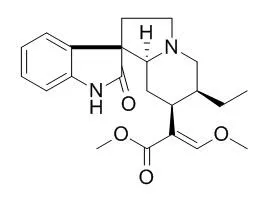| Kinase Assay: |
| J Neuroimmune Pharmacol. 2014 Jun;9(3):380-7. | | Corynoxine, a natural autophagy enhancer, promotes the clearance of alpha-synuclein via Akt/mTOR pathway.[Pubmed: 24522518] | Parkinson's disease (PD) is the second most common neurodegenerative disorder characterized by the accumulation of protein aggregates (namely Lewy bodies) in dopaminergic neurons in the substantia nigra region of the brain. Alpha-synuclein (α-syn) is the major component of Lewy bodies in PD patients, and impairment of the autophagy-lysosomal system has been linked to its accumulation. In our previous study, we identified an oxindole alkaloid Corynoxine B (Cory B), isolated from Uncaria rhynchophylla (Miq.) Jacks (Gouteng in Chinese), as a Beclin-1-dependent autophagy inducer.
METHODS AND RESULTS:
In this work, we show that Cory, an enantiomer of Cory B, also induces autophagy in different neuronal cell lines, including N2a and SHSY-5Y cells, which is paralleled with increased lysosomal enzyme cathepsin D. In vivo, Cory promotes the formation of autophagosomes in the fat bodies of Drosophila. By inducing autophagy, Cory promotes the clearance of wild-type and A53T α-syn in inducible PC12 cells. Interestingly, different from its enantiomer Cory B, Cory induces autophagy through the Akt/mTOR pathway as evidenced by the reduction in the levels of phospho-Akt, phospho-mTOR and phospho-p70 S6 Kinase.
CONCLUSIONS:
Collectively, our findings provide experimental evidence for developing Cory as a new autophagy enhancer from Chinese herbal medicine, which may have potential application in the prevention or treatment of PD. |
|






 Cell. 2018 Jan 11;172(1-2):249-261.e12. doi: 10.1016/j.cell.2017.12.019.IF=36.216(2019)
Cell. 2018 Jan 11;172(1-2):249-261.e12. doi: 10.1016/j.cell.2017.12.019.IF=36.216(2019) Cell Metab. 2020 Mar 3;31(3):534-548.e5. doi: 10.1016/j.cmet.2020.01.002.IF=22.415(2019)
Cell Metab. 2020 Mar 3;31(3):534-548.e5. doi: 10.1016/j.cmet.2020.01.002.IF=22.415(2019) Mol Cell. 2017 Nov 16;68(4):673-685.e6. doi: 10.1016/j.molcel.2017.10.022.IF=14.548(2019)
Mol Cell. 2017 Nov 16;68(4):673-685.e6. doi: 10.1016/j.molcel.2017.10.022.IF=14.548(2019)